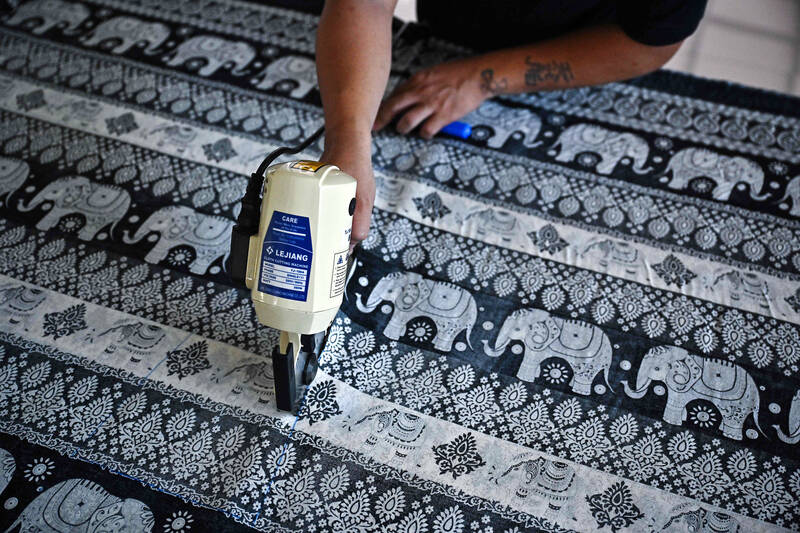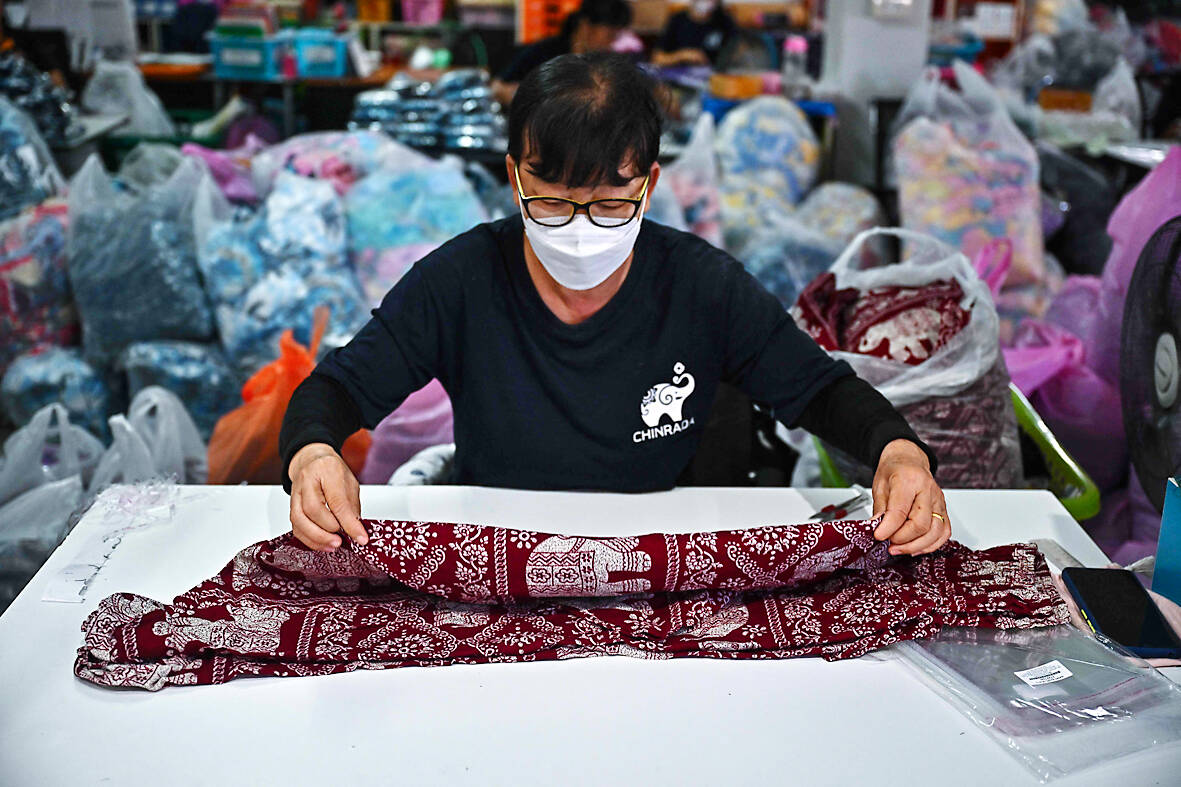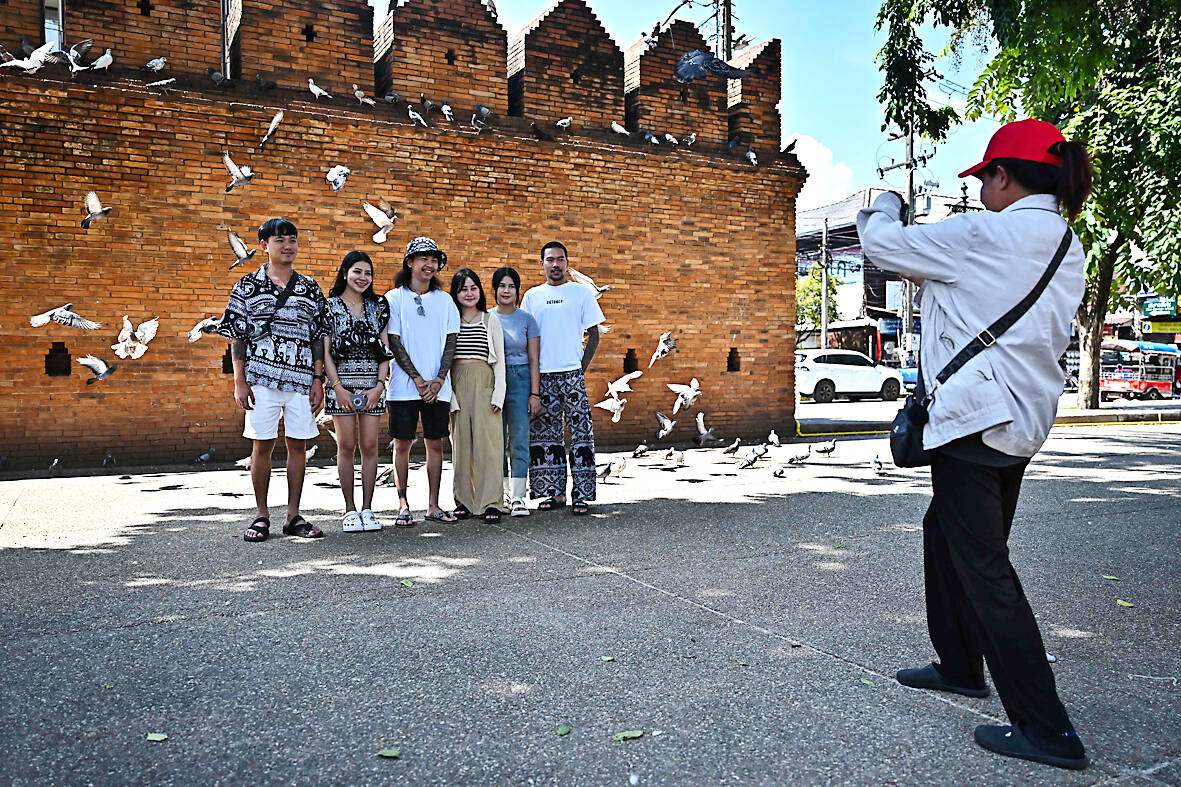An elegant Thai socialite poses in sunglasses, a designer handbag discreetly visible in the Instagram photo, her stylish outfit completed by a pair of... elephant print pants?
Infamous across Southeast Asia, so-called elephant pants made of thin baggy cotton were once synonymous with grubby backpackers in search of themselves -- and the nearest Chang beer, a popular local lager.
The pachyderm pants were adopted by foreigners during an early wave of budget Southeast Asia travel, as visitors sought to appropriate “authentic” culture, despite there being little truly Thai about them, researchers say.

Photo: AFP
While they are still sold from stalls alongside Bangkok’s tourist haven Khaosan Road for about 150 baht (US$4), young Thai influencers and the kingdom’s high society are increasingly reclaiming them.
“The pants are dope,” said influencer Dalintan “MoRich” Promphinit, after cavorting in a bright yellow set for his two million TikTok followers in April.
“They’re not just souvenirs foreign tourists buy,” he said. “Thais are rocking them too.” “It’s like a fashion statement,” with a “teen street fashion vibe,” said the 19-year-old. His fans instantly loved his latest look.

Photo: AFP
“They kept asking where I got it,” he said.
‘A SENSATION’
Posing at Chiang Mai’s ancient wall, Toei, 27, who only gave her first name, is clad head-to-toe in the “adorable” elephant print.

Photo: AFP
“Initially, they were a hit among tourists, but now they’re trending on TikTok, thanks to influencers,” her 28-year-old friend Ong, also sporting the print, added. “So, we embraced the trend.”
A half-hour drive away is Kingkarn “Jack” Samon’s factory, where rolls and rolls of pachyderm-inspired prints are measured, sliced and stitched.
“The pants have become a sensation in Thailand,” she said during a tour of the facility, which has around 100 workers, producing 1,000-2,000 items daily.
Orders — including shirts, dresses, even handbags — are up 30 percent since the end of the Covid pandemic. The pants account for 85 percent of sales.
Hers is just a small cog in the kingdom’s textile and garment industry, which accounts for about three percent of its GDP.
Kingkarn imports the fabric from China, shipping it to Bangkok for printing, before it returns to her factory, 700km away.
The design’s popularity, however, has not been without controversy.
An online debate brought local reporters to her door after some Cambodians claimed Thailand had appropriated the elephant print, Kingkarn said.
Refusing to be drawn on the latest iteration of the historic rivalry, she did admit with a grin: the debate has boosted sales.
‘THINK VERSACE’
Ultimately, little about the pants are Thai, said Kanjana Thepboriruk, an associate professor at Northern Illinois University’s Center for Southeast Asian Studies.
Their adoption by foreigners, attempting to stake a claim on “authentic experiences,” instead meant Thais viewed them as international, she said.
“I see the elephant pants as the latest way that young rich Thais or aspiring middle-class Thais align their identity with Westerners,” she said.
And high-end retailers have quickly cottoned on.
Inside a luxury Bangkok mall, Bangkok Tales’s elephant pants sell for 1,090 baht (US$30). “When people think about elephant pants, (they think of them as) really cheap, but I want to make them look like Versace,” explained founder and designer Rawiwan “Gigi” Worasinsiri.
Rawiwan initially targeted tourists, but the pandemic flipped her business model, with Thais filling the deficit.
“I was surprised,” she said, crediting TikTok for her success.
At the other end of the spectrum in Bangkok’s sprawling Chatuchak market, 32-year-old Onnitsa Kuren already owns three pairs.
“Elephant-patterned pants go with anything — just pair them with a T-shirt,” she said.
Musing as she browsed, she added, “I’m currently on the lookout for a red pair.”

In the March 9 edition of the Taipei Times a piece by Ninon Godefroy ran with the headine “The quiet, gentle rhythm of Taiwan.” It started with the line “Taiwan is a small, humble place. There is no Eiffel Tower, no pyramids — no singular attraction that draws the world’s attention.” I laughed out loud at that. This was out of no disrespect for the author or the piece, which made some interesting analogies and good points about how both Din Tai Fung’s and Taiwan Semiconductor Manufacturing Co’s (TSMC, 台積電) meticulous attention to detail and quality are not quite up to

April 21 to April 27 Hsieh Er’s (謝娥) political fortunes were rising fast after she got out of jail and joined the Chinese Nationalist Party (KMT) in December 1945. Not only did she hold key positions in various committees, she was elected the only woman on the Taipei City Council and headed to Nanjing in 1946 as the sole Taiwanese female representative to the National Constituent Assembly. With the support of first lady Soong May-ling (宋美齡), she started the Taipei Women’s Association and Taiwan Provincial Women’s Association, where she

It is one of the more remarkable facts of Taiwan history that it was never occupied or claimed by any of the numerous kingdoms of southern China — Han or otherwise — that lay just across the water from it. None of their brilliant ministers ever discovered that Taiwan was a “core interest” of the state whose annexation was “inevitable.” As Paul Kua notes in an excellent monograph laying out how the Portuguese gave Taiwan the name “Formosa,” the first Europeans to express an interest in occupying Taiwan were the Spanish. Tonio Andrade in his seminal work, How Taiwan Became Chinese,

Mongolian influencer Anudari Daarya looks effortlessly glamorous and carefree in her social media posts — but the classically trained pianist’s road to acceptance as a transgender artist has been anything but easy. She is one of a growing number of Mongolian LGBTQ youth challenging stereotypes and fighting for acceptance through media representation in the socially conservative country. LGBTQ Mongolians often hide their identities from their employers and colleagues for fear of discrimination, with a survey by the non-profit LGBT Centre Mongolia showing that only 20 percent of people felt comfortable coming out at work. Daarya, 25, said she has faced discrimination since she